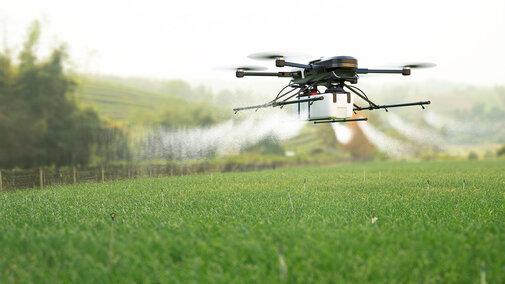If your commercial/noncommercial pesticide applicator license expires in 2023, it’s time to start thinking about recertification training. Recertification must be completed by Saturday, April 15.
In 2023, commercial/noncommercial applicators can recertify by either:
- Attending a face-to-face recertification training session,
- Completing online commercial/noncommercial recertification training, or
- Attending an approved conference. Approved conferences include:
- Crop Production Clinics (categories offered*: 01, D/R)
- Custom Applicator School (categories offered: 01)
- Nebraska Turf Conference (categories offered: 04)
- Urban Pest Management Conference (categories offered: 08, 08W, 09, 11, 14)
- Nebraska Aviation Trades Association Convention (categories offered: 01, 07, 12)
*All approved conferences include the General Standards category, 00.
If you plan to attend a face-to-face recertification session or conference, please pre-register. Be sure that the event you choose offers the category or categories you need. Some categories do not have recertification opportunities (01A, 02, 03, 05S, 06, REG, D/R); these categories require you to retake an exam to recertify.
Online recertification training for commercial/noncommercial applicators will be available from Sunday, Jan. 1 to Saturday, April 15, 2023. To access this training, please visit https://pested.unl.edu on or after Jan. 1. The cost of the online training is $80; face-to-face training is $95 with pre-registration.
New Applicators/Adding a Category to an Existing License
Those looking to get a commercial/noncommercial license for the first time or add a new applicator category to an existing license must pass exams administered by the Nebraska Department of Agriculture (NDA). “Initial” certification can be done at any time during the year, though initial training sessions end in March.
New commercial/noncommercial applicators must pass a General Standards exam (covering information relevant to all applicators) and at least one category-specific exam.
To add a category to an existing license, applicators must pass that category’s exam.
Exams are offered at initial training sessions, testing-only sessions and through the Pearson VUE computerized testing service.
The Pesticide Education Office strongly recommends that you prepare for your applicator exams. Exam preparation options are as follows:
- Purchase study manuals for each category needed and attend an initial training session (exams are taken at the end of the session). If you plan to attend an initial training session, please pre-register.
- Purchase study manuals for each category needed and take your exams at a testing-only session.
- Purchase enhanced digital versions of the study manuals (“FlipBooks”) for each category needed. If you purchase FlipBooks, you do not need to attend initial training too. However, you will still need to arrange to take your exams. The Pesticide Education Office recommends this option — FlipBooks combine the study manuals with the videos shown at initial training sessions into one digital product, saving you money.
After passing your applicator exams, the NDA will mail you a postcard requesting payment of a licensing fee (there is no fee for noncommercial licenses). Once the fee is paid, NDA issues your three-year license.
Background
The U.S. Environmental Protection Agency (EPA) classifies pesticide products as restricted-use pesticides (RUP) if they pose an increased risk to human health or the environment. To purchase and use RUPs, one must be certified/licensed by the state where they will be using the products. In Nebraska, commercial applicators who handle general-use pesticides (available to the general public) for structural or ornamental/turf pest control must also be certified/licensed. Likewise, applicators who handle general-use pesticides for outdoor vector control (e.g., mosquito control) on behalf of a political subdivision of the state (villages, towns, counties, etc.) must be certified/licensed. Commercial/noncommercial applicators in Nebraska must demonstrate their competency to handle RUPs by passing written exams. Nebraska applicator licenses last three years and must then be renewed.
This online tool can help you determine if you need a license, which type of license you need and what your options are for getting it.
Important Changes
Both new and recertifying applicators should be aware of changes to Nebraska’s applicator certification/licensing program:
- The minimum age for certified applicators is now 18 years.
- New and recertifying applicators should be prepared to present government-issued identification (e.g., a driver’s license) at training and exam sessions.
- The appearance of commercial/noncommercial applicator licenses will be updated. They will now be a blue color and will show the “00” category in which all applicators must be certified.
- Some commercial/noncommercial applicator categories have changed slightly. The most notable change regards rodent burrow fumigation — these applications, which have previously fallen under the Wildlife Damage Control category (14), will now fall under the Non-Soil and Structural Fumigation category (11). See above for how to add a category to an existing license. A comparison of the previous category definitions with the new definitions being phased in is available online.
These changes are being phased in over a three-year period (2022-24) as applicators come up for recertification. For example, an applicator certified in category 14 whose license expires in 2024 can continue treating rodent burrows with fumigants until he/she recertifies in 2024. At that point, the applicator would need to add category 11 to their license to continue using rodent burrow fumigants. For questions on these changes, please call the NDA at 402-471-2351 or the Pesticide Education Office at 402-472-1632.
Other Pesticide Training You May Need
XtendiMax®, Engenia® and Tavium® are RUPs containing dicamba that can only be used on dicamba-tolerant soybean and cotton crops. In addition to requiring a pesticide applicator license, you must also take yearly dicamba-specific training before purchasing or applying any of these three herbicides. The products’ registrants (Bayer, BASF and Syngenta, respectively) will provide this training. For more information on RUP dicamba, please visit the NDA’s website.
Paraquat is an herbicide that is acutely toxic to humans; all products containing paraquat are RUPs. In addition to requiring a pesticide applicator license, you must take paraquat-specific training (every three years) to purchase or apply paraquat products. This paraquat training is available for free on the Extension Foundation Online Campus and can be completed at any time.

